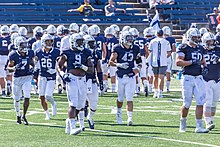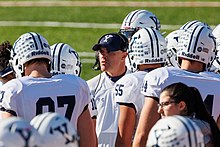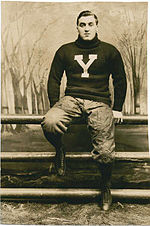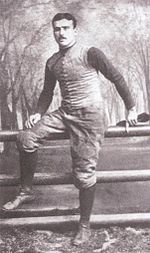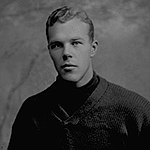Yale Bulldogs football
Since their founding, the Bulldogs have won 27 national championships, two of the first three Heisman Trophy winners (Larry Kelley in 1936 and Clint Frank in 1937), 100 consensus All-Americans, 28 College Football Hall of Fame inductees, including the "Father of American Football" Walter Camp, the first professional football player Pudge Heffelfinger, and coaching giants Amos Alonzo Stagg, Howard Jones, Tad Jones and Carmen Cozza.
[4] It was Camp who pioneered the fundamental transition of American football from rugby when in 1880, he succeeded in convincing the Intercollegiate Football Association to discontinue the rugby "scrum", and instead have players line up along a "line of scrimmage" for individual plays, which begin with the snap of the ball and conclude with the tackling of the ballcarrier.
The famed sportswriter Grantland Rice wrote that Yale, along with Harvard and Princeton, was one of the top teams in the late 19th and early 20th century.
However, "It was has been a different story in the later years when the far west, the midwest, the southwest, and the south have taken charge as Harvard, Yale, and Princeton fell behind.
The NCAA decided to split Division I into two subdivisions in 1978, then called I-A for larger schools, and I-AA for the smaller ones.
The NCAA had devised the split, in part, with the Ivy League in mind, but the conference did not move down for four seasons despite the fact that there were many indications that the ancient eight were on the wrong side of an increasing disparity between the big and small schools.
In 1982, the NCAA created a rule that stated a program's average attendance must be at least 15,000 to qualify for I-A membership.
Choosing to stay together rather than stand their ground separately in the increasingly competitive I-A subdivision, the Ivy League moved down into I-AA starting with the 1982 season.
It was the perfect setting for New Haven native Albie Booth, also known as "Little Boy Blue" to perform his heroics vs. Army in November 1929 and for the 47-yard "kick that made history" by Randall "Randy" C. Carter, '77, snapped by the stalwart center from Illinois, Ralph Bosch, '77 and surely placed by John "Nubes" Nubani, '78, in the last seconds of the 1975 Yale-Dartmouth game to win the game for Yale, 16–14.
[24] More than 30 players from Yale have gone on to play in the National Football League, including running backs Calvin Hill, Chuck Mercein and Chris Hetherington, defensive backs Dick Jauron, Gary Fencik and Kenny Hill, tight ends Eric Johnson and John Spagnola, quarterback Brian Dowling, and linemen Fritz Barzilauskas, Century Milstead and Mike Pyle.

